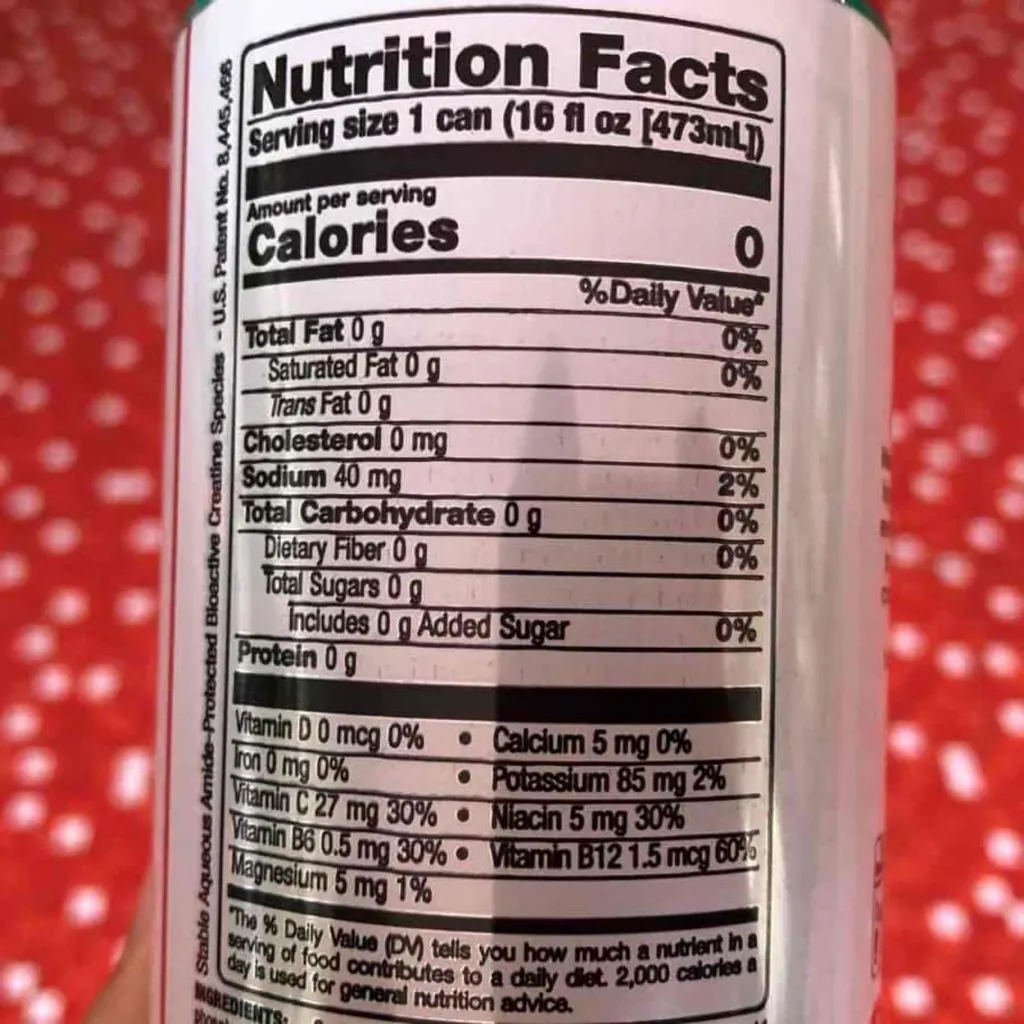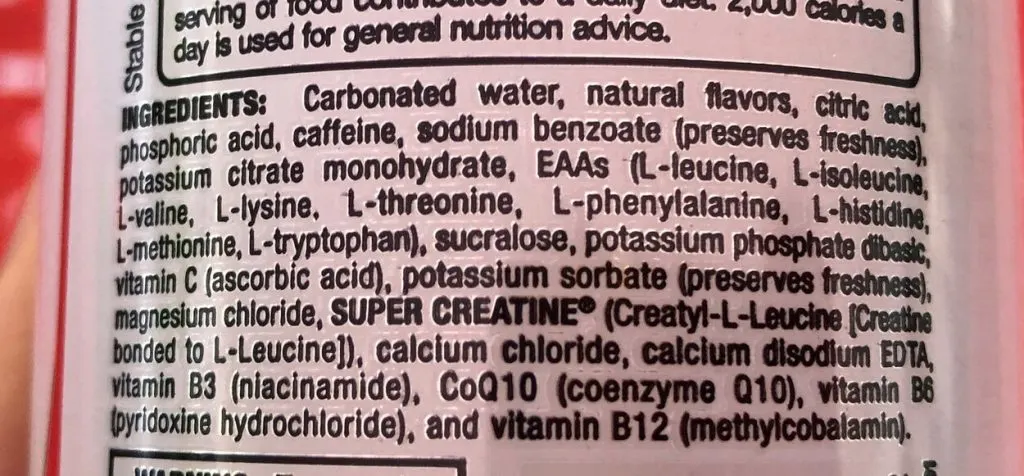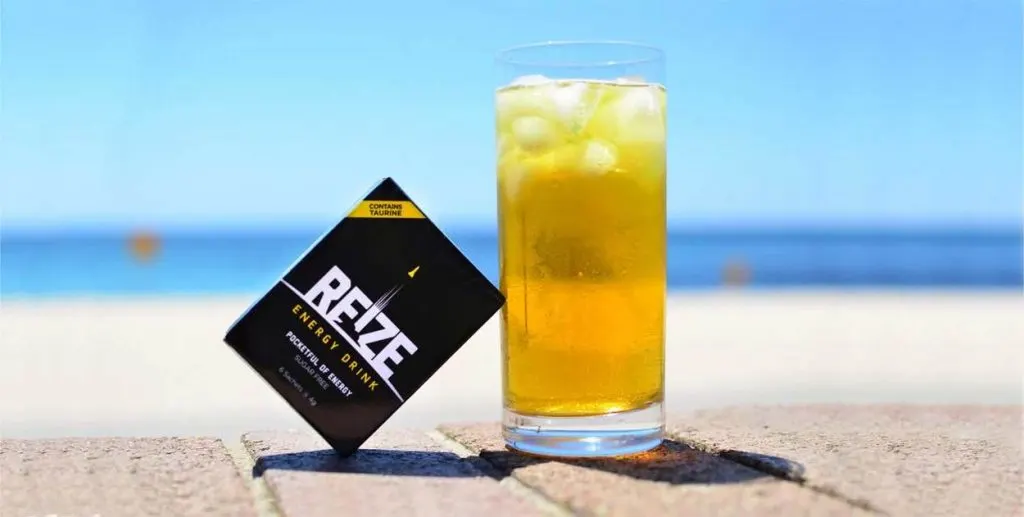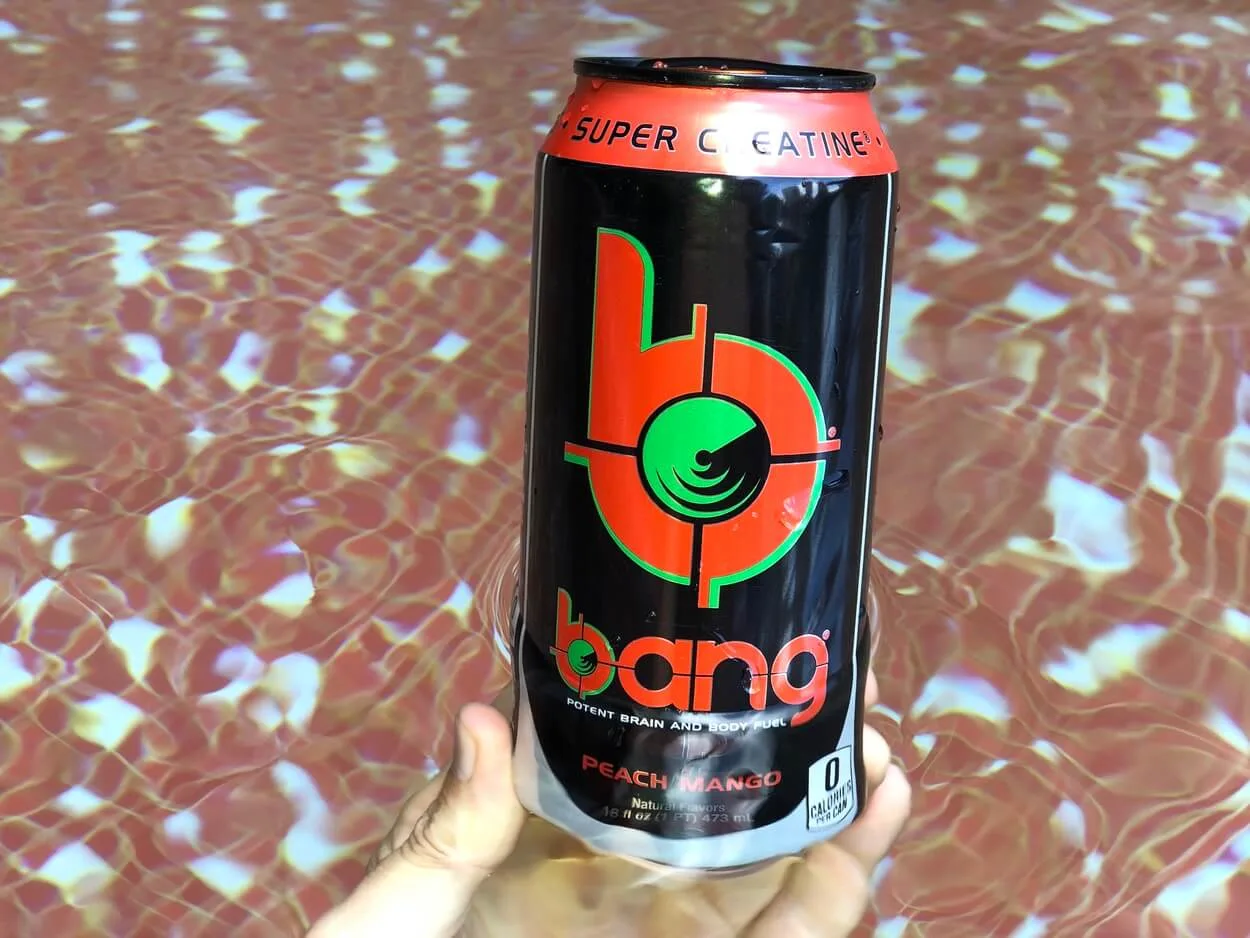Although Bang Energy is a great pre-workout drink with its explosive boost and various benefits, you may find yourself wondering if there are any negative effects to drinking it in the long run.
Bang Energy can cause a number of side effects like heart problems, dizziness, rapid heart rate, and insomnia due to its high caffeine content and other ingredients. Keep in mind to control your daily consumption of Bang since its caffeine content is already close to the recommended FDA daily limit.
If you want to find out more about how Bang might affect your health in the long term, read on for a detailed discussion of Bang’s ingredients and their potential effects on you.
But, if you’re more interested in finding out if Bang’s effectiveness lives up to the hype, check out the article I’ve written on whether Bang Energy works or not for an in-depth look.
Let’s get started…
Bang Energy Drink Nutrition Facts

First off, let’s go through the standard values of a 16 fl. oz can of Bang Energy:
| Typical Values | Bang (16 fl.oz) |
| Energy | 0 calories |
| Protein | 0g |
| Fat (Of which saturated) | 0g (0g) |
| Carbohydrate (Of which sugars) | 0g (0g) |
| Cholesterol | 0mg |
| Sodium | 40mg |
| Potassium | 85mg |
| Caffeine | 300mg |
| Vitamin B3 (Niacin) | 5mg |
| Vitamin B6 | 0.5mg |
| Vitamin B12 | 1.5μg |
| Vitamin C | 27mg |
| Magnesium | 5mg |
How Many Calories Are In Bang Energy?
A 16 fl. oz can of Bang Energy is entirely calorie-free.
If you’re looking for an energy drink to complement your diet, or just don’t want to deal with any unnecessary excess calories, Bang Energy definitely ticks all the boxes.
Being a zero-calorie energy drink, Bang is one of the healthier options out there compared to other brands like Monster, which has 210 calories per 16 fl. oz.
For recommendation, the suggested day-by-day caloric intake is between 2000 to 2400 calories for women and 2400 to 3000 calories for men.
Of course, since Bang contains zero calories, you would be getting most of your energy from the caffeine within the drink. So, before you head anywhere for the day, be sure to grab something to eat as drinking a can of Bang won’t keep your stomach sustained for a long time.
Though, if you feel that Bang won’t suit your diet, check out more great options mentioned in my article on the best zero-calorie energy drinks.
Bang Energy Drink Ingredients

Here’s a quick look at the ingredients within a 16 fl. oz can of Bang:
- Carbonated Water
- Citric Acid Anhydrous
- Natural Flavours
- Malic Acid
- Caffeine Anhydrous
- Sodium Benzoate (Preserves freshness)
- Potassium Citrate Monohydrate
- EAAs (L-leucine, L-isoleucine, L-valine, L-lysine, L-threonine, L-phenylalanine, L-histidine, L-methionine, L-tryptophan)
- Sucralose
- Potassium Phosphate Dibasic
- Vitamin C (Ascorbic Acid)
- Potassium Sorbate (Preserves freshness)
- Magnesium Chloride
- SUPER CREATINE® (Creatyl-L-Leucine [Creatine bonded to L-Leucine])
- Calcium Chloride
- Calcium Disodium EDTA
- Vitamin B3 (Niacinamide)
- CoQ10 (Coenzyme Q10)
- Vitamin B6 (Pyridoxine Hydrochloride)
- Vitamin B12 (Methylcobalamin)
How Much Caffeine Is In Bang Energy Drink?
A 16 fl. oz can of Bang Energy contains 300mg of caffeine, which is a pretty high amount for an energy drink of its size.
With 300mg of caffeine, Bang is one of the highly caffeinated energy drinks out there which offers quite a punch to keep you awake for those all-nighters and graveyard shifts.
If your caffeine tolerance happens to be similar to mine, which is around 50mg to 100mg per drink, 300mg of caffeine would certainly be a bit too much for your liking.
That said, whether you can handle Bang’s high caffeine content or not depends on your caffeine metabolism and how sensitive you are to caffeine.
It’s also important to keep in mind that the FDA advises a maximum caffeine intake of up to 400mg per day for healthy adults. Excessive consumption of caffeine could eventually lead to adverse effects like:
- rapid heart rhythm
- restlessness and shakiness
- insomnia
- dizziness
- headaches
- dehydration
In addition, make sure that you keep an eye out for the warning label that is attached to the can of Bang Energy. This label will tell you how many cans you are allowed to consume in one day as well as the possible adverse consequences of consuming too much caffeine.
In any case, be sure to moderate your Bang Energy intake and monitor the number of caffeinated beverages you consume in your overall diet.
Is There Sugar In Bang Energy Drink?

Bang Energy Drink is completely sugar-free.
If you’re wondering why Bang tastes sweet, it uses artificial sweeteners to improve the flavor and sweetness of the drink.
I’ll be explaining more about that in the following section:
Does Bang Energy Drink Have Artificial Sweeteners?
Bang Energy Drink does have an artificial sweetener, namely sucralose.
Sucralose is a zero-calorie sweetener that’s mainly used to improve the flavor and taste of food products.
Since sucralose doesn’t technically contain carbs, it won’t raise your blood sugar levels, making it a suitable alternative for those with diabetes. But if you do have diabetes, do make sure to discuss it with your doctor before using any artificial sweeteners.
While sucralose won’t cause any changes to your overall caloric intake, it’s best to consume it within a tolerable limit, as there are still concerns regarding the long-term side effects of artificial sweeteners.
As long as you aren’t including sucralose in every meal, you should be alright.
Is It Bad To Drink A Can Of Bang Energy Every Day?
Bang contains a hefty 300mg of caffeine, which can cause side effects if you consume it excessively or if you’re caffeine-sensitive. These side effects include insomnia, anxiety, and headaches. It is not recommended that you drink Bang every day since it can lead to long-term effects like dependence.
Having Bang Energy every day does have its advantages, as you’ll get an energy boost that can keep you awake and maintain your focus on your daily tasks for many hours.
Plus, you’ll also get a boost in terms of performance, both physical and mental, due to the caffeine present in Bang Energy.
Caffeine is a well-known stimulant that can improve certain aspects of exercise performance, such as endurance, speed, and strength.
A study involving 9 cyclists reported that caffeine consumption increased workload by 7.4%, while with carbs, there was only a 5.2% increase.
Besides, Bang Energy can also enhance cognition in terms of alertness, vigilance, reaction time, and attention.
That said, if you’re not mindful of the number of cans you drink, you might consume more caffeine than you intend to. As Bang has high caffeine content, you can only have one can in a day.
Consuming more than one can daily cause a number of negative effects on your health, which isn’t something you would want.
In any case, there are some benefits to drinking Bang every day, as you’ll get your daily boost, but having too much of this drink could lead to some serious health problems.
I’d recommend limiting your consumption of Bang for times when you really need a huge boost to help you push through the day. Other than that, you could go for less caffeinated energy drinks instead.
Are Bang Energy Drinks Bad For Your Heart?
Bang Energy Drinks can be bad for your heart if you have any heart-related conditions. If you’re perfectly healthy, it’s still best not to drink Bang Energy often too.
Bang Energy contains a number of ingredients, mainly caffeine. While caffeine largely affects the central nervous system and brain, it also has an effect on your heart.
Consuming caffeine can lead to an increase in heart rate, and blood pressure and cause abnormal heart rhythm. An increase in blood pressure and heart rate could increase the risk of strokes, heart attacks, and other severe heart problems.
That said, unless you have a pre-existing medical condition, you should be completely okay after drinking Bang.
In any case, the best way you go about it is to control your consumption of Bang and moderate your overall caffeine intake.
Is Bang Energy Drink Bad For Your Kidneys?
Bang Energy Drink can be bad for your kidneys if it’s consumed regularly.
Although Bang might not have any sugar or calories, it doesn’t mean that it’s entirely good for your kidneys. The high caffeine content of Bang Energy could lead to frequent urination since caffeine is a diuretic, which can cause dehydration if you don’t drink any water later on.
In the long run, your kidneys might get damaged by the large amounts of caffeine you consume. As such, those with kidney problems, or who are on dialysis, are advised to steer clear of energy drinks.
All in all, the best way you can enjoy Bang without worrying about the consequences on your kidneys later is to moderate your intake and have a glass of water after drinking Bang.
After all, water is great for cleaning and clearing the toxins in your kidneys, so it’ll be good to wash down with it after a highly caffeinated drink.
What does bang do to your brain?
In theory, ingredients in Bang such as BCAAs and CoQ10 help with brain function.
In addition, BCAA intake is associated with a lower risk of developing depression although a lot more research is needed to prove such a claim.
Moreover, CoQ10 increases brain and mitochondrial concentrations which points to evidence that it may aid with neurodegenerative diseases.
I know these all sound promising but you should know that the amount of these ingredients infused in Bang Energy isn’t enough to get the full benefit.
Still, Bang is a good source of an energy boost!
Read more about the benefits of energy drinks and why I think they’re awesome in this article!
Is Bang bad for your heart?
Regular consumption of energy drinks including Bang Energy may trigger cardiovascular diseases.
Overconsumption of Bang Energy may result in rapid heart rate and chest pains due to the active ingredients that affect the blood flow in the heart.
That said, you must be careful when consuming energy drinks to avoid heart problems and other adverse effects.
If you’re wondering if energy drinks can really make you ill, I have the answer for you in this article!
Alternatives To Bang Energy Drink
If Bang isn’t your thing, don’t worry as there are a number of other great energy drinks on the market.
Here’s a quick list of some awesome alternatives:
- Monster
- Red Bull
- Raze
- 3D Energy
- Full Throttle
- Aspire
- 28 Black
- AMP Energy
- Coca-Cola Energy
- Guru
- Reign
Powdered energy drinks are also good options, as they’re customizable and can be adjusted to your preferences:
- Zipfizz
- G Fuel
- Advocare Spark
- REIZE (my fave)
REIZE (10 Out Of 10)

If you’re not sure you can handle the high caffeine content of Bang Energy, how about giving REIZE a shot?
REIZE is a powdered energy drink that comes in light 4g sachets for your convenience. Like Bang, REIZE is sugar-free and has only 11 calories per serving, along with a sensible 50mg of caffeine.
REIZE is also packed with a smart blend of beneficial ingredients such as ginseng, taurine, and B vitamins that work together to give you a smooth boost without the dreaded sugar crashes.
The best part is that REIZE ships to your home for only $1 per drink, which is amazing value for money.
Give REIZE a try, and you might find it to be a better option than Bang Energy.

